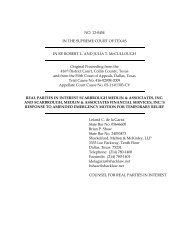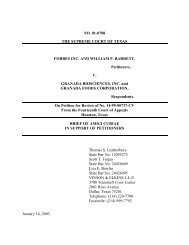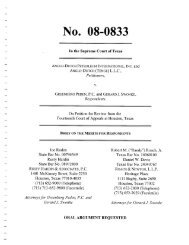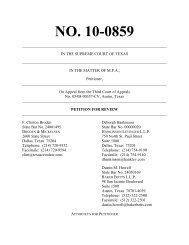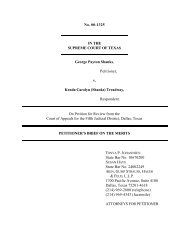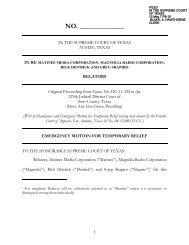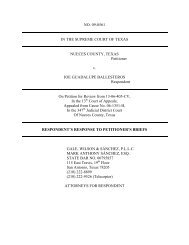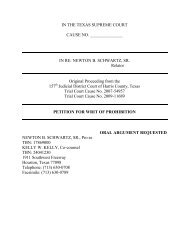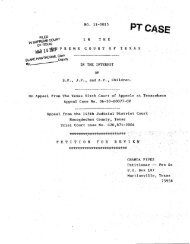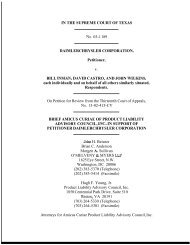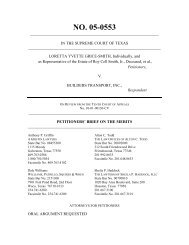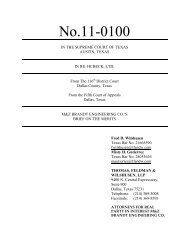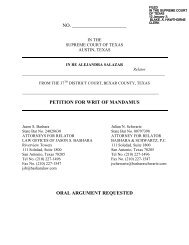Petition for Writ of Mandamus - Filed - Supreme Court of Texas
Petition for Writ of Mandamus - Filed - Supreme Court of Texas
Petition for Writ of Mandamus - Filed - Supreme Court of Texas
You also want an ePaper? Increase the reach of your titles
YUMPU automatically turns print PDFs into web optimized ePapers that Google loves.
e included in the combined group report even if, on a<br />
separate company basis, the member has $1,030,000 or<br />
less in total revenue.<br />
When filing a combined No Tax Due In<strong>for</strong>mation Report, an<br />
Affiliate Schedule (Form 05-166) containing all <strong>of</strong> the required<br />
in<strong>for</strong>mation <strong>for</strong> each member must be submitted. In addition,<br />
an in<strong>for</strong>mation report must be submitted <strong>for</strong> each member that<br />
is organized in <strong>Texas</strong> or has physical presence in <strong>Texas</strong>.<br />
Tiered Partnership Election<br />
A tiered partnership election is not allowed if the lower tier<br />
entity, be<strong>for</strong>e passing total revenue to the upper tier entities,<br />
has $1,030,000 or less in annualized total revenue or owes<br />
less than $1,000 in tax. Do NOT blacken the Tiered<br />
Partnership Election circle.<br />
If a tiered partnership election is made, the lower tier entity<br />
may file the No Tax Due In<strong>for</strong>mation Report ONLY if the<br />
entity passed 100% <strong>of</strong> its total revenue to upper tier entities.<br />
Upper tier entities are not eligible to file a No Tax Due<br />
In<strong>for</strong>mation Report if the tiered partnership election is made.<br />
Item 1. This entity is a passive entity as defined in<br />
Chapter 171, Tax Code.<br />
A partnership (general, limited and limited liability) or trust<br />
(other than a business trust) may qualify as a passive entity<br />
and not owe any franchise tax <strong>for</strong> a reporting period if at<br />
least 90% <strong>of</strong> the entity's federal gross income (as reported<br />
on the entity's federal income tax return), <strong>for</strong> the period upon<br />
which the tax is based, is from the following sources:<br />
• dividends, interest, <strong>for</strong>eign currency exchange gain, periodic<br />
and non periodic payments with respect to notional<br />
principal contracts, option premiums, cash settlements<br />
or termination payments with respect to a financial<br />
instrument, and income from a limited liability company;<br />
• distributive shares <strong>of</strong> partnership income to the extent that<br />
those distributive shares <strong>of</strong> income are greater than zero;<br />
• net capital gains from the sale <strong>of</strong> real property, net gains<br />
from the sale <strong>of</strong> commodities traded on a commodities<br />
exchange and net gains from the sale <strong>of</strong> securities; and<br />
• royalties from mineral properties, bonuses from mineral<br />
properties, delay rental income from mineral properties<br />
and income from other nonoperating mineral interests<br />
including nonoperating working interests.<br />
Passive income does not include rent or income received<br />
by a nonoperator from mineral properties under a joint<br />
operating agreement, if the nonoperator is a member <strong>of</strong> an<br />
affiliated group and another member <strong>of</strong> that group is the<br />
operator under the same joint operating agreement.<br />
Passive entities are not required to file an Ownership<br />
In<strong>for</strong>mation Report (Form 05-167).<br />
Item 2. This entity's annualized total revenue is below<br />
the no tax due threshold.<br />
If annualized total revenue is less than or equal to<br />
$1,030,000, the entity qualifies to file the No Tax Due<br />
In<strong>for</strong>mation Report. See the annualized total revenue<br />
section <strong>of</strong> these instructions <strong>for</strong> more in<strong>for</strong>mation.<br />
Note: The $1,030,000 no tax due threshold does not apply to an<br />
upper tier entity if a tiered partnership election is made.<br />
Item 3. This entity has zero <strong>Texas</strong> gross receipts.<br />
The apportionment factor <strong>of</strong> an entity with zero <strong>Texas</strong> gross<br />
receipts is zero; there<strong>for</strong>e, no tax is due. See the instructions<br />
<strong>for</strong> Item 23 <strong>of</strong> Form 05-158-B <strong>for</strong> additional in<strong>for</strong>mation on<br />
computing <strong>Texas</strong> gross receipts.<br />
Item 4. This entity is a Real Estate Investment Trust<br />
(REIT) that meets the qualifications specified in 171<br />
.0002(c)(4), Tax Code.<br />
A REIT that meets the qualifications <strong>of</strong> Sec.171.0002(c)(4),<br />
Tax Code, is not a taxable entity <strong>for</strong> the year upon which<br />
the report is based. The REIT must establish its nontaxable<br />
status by filing a No Tax Due In<strong>for</strong>mation Report <strong>for</strong> the<br />
period upon which the report is based.<br />
A REIT or its qualified REIT subsidiary entities are not<br />
considered taxable entities if:<br />
• the REIT holds interests in limited partnerships or other<br />
entities that are taxable entities and that directly hold real<br />
estate; and<br />
• the REIT does not directly hold real estate, other than<br />
real estate it occupies <strong>for</strong> business purposes.<br />
An in<strong>for</strong>mation report must be submitted by each REIT or<br />
qualified REIT subsidiary:<br />
• a Public In<strong>for</strong>mation Report (Form 05-102) <strong>for</strong> each REIT<br />
legally organized as a corporation or LLC and<br />
• an Ownership In<strong>for</strong>mation Report (Form 05-167) <strong>for</strong> each<br />
REIT legally organized as a partnership, trust or association.<br />
Item 5a. Accounting year begin date<br />
See the accounting period begin date requirements in the<br />
annual and final report sections.<br />
Item 5b. Accounting year end date<br />
See the accounting period end date requirements in the<br />
annual and final report sections.<br />
Item 6. Total Revenue<br />
Enter the amount <strong>of</strong> total revenue using the instructions <strong>for</strong><br />
Items 1-10 <strong>of</strong> Form 05-158-A. A passive entity or a REIT<br />
may leave this blank.<br />
Signature Block: Report may be signed by an <strong>of</strong>ficer,<br />
director or other authorized person, This includes a paid<br />
preparer authorized to sign the report.<br />
Form 05-164<br />
<strong>Texas</strong> Franchise Tax Extension Request<br />
Filing Requirements: Any entity (including a combined<br />
group) that cannot file its annual (including the first annual)<br />
or final report by the original due date may request an<br />
extension <strong>of</strong> time to file on or be<strong>for</strong>e the due date. A<br />
combined group must also file an Extension Affiliate List<br />
(Form 05-165) with the extension request.<br />
An extension <strong>for</strong> an annual, non-EFT (electronic funds<br />
transfer) payor will be through Nov. 15, 2012. When<br />
submitting the extension request, the taxable entity must remit<br />
21



